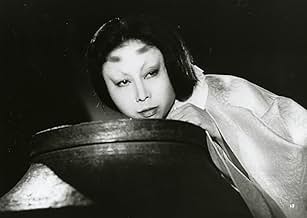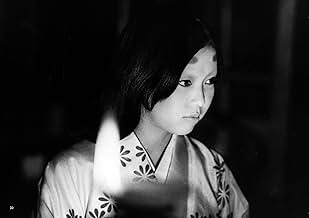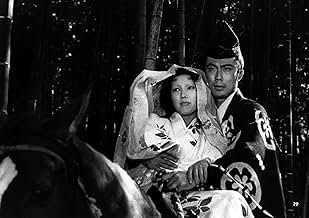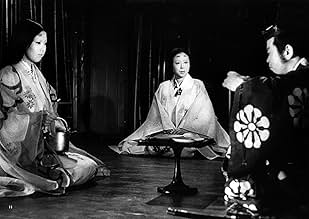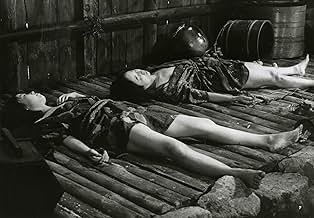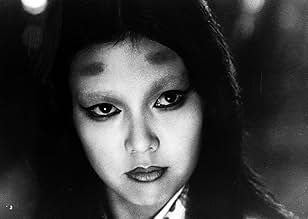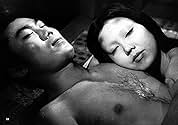IMDb RATING
7.7/10
9.4K
YOUR RATING
Two women are raped and killed by samurai soldiers. Soon they reappear as vengeful ghosts who seduce and brutally murder the passing samurai.Two women are raped and killed by samurai soldiers. Soon they reappear as vengeful ghosts who seduce and brutally murder the passing samurai.Two women are raped and killed by samurai soldiers. Soon they reappear as vengeful ghosts who seduce and brutally murder the passing samurai.
- Awards
- 2 wins total
- Director
- Writer
- All cast & crew
- Production, box office & more at IMDbPro
Featured reviews
Some obvious similarities to Shindo's earlier ONIBABA, as a woman and her mother-in-law are raped by samurai, and turn to supernatural forces to seek their revenge. Shindo uses an impressive array of tricks to maintain the unsettling, creepy atmosphere -- sparse Noh-style staging, bold chiaroscuro lighting, avant-garde soundtrack, abrupt time cuts, wire work, superimpositions and other special effects. It's a very atmospheric kaidan, almost Gothic in tone. Rape is of course a disturbingly common occurrence in Japanese cinema, but here Shindo uses it as the groundwork for a decidedly feminist agenda. The film does have a few pacing issues, particular during the erotic portions in the middle (although some of it is lovely). I thought more could have been done with this story, but the visual aspects and the mood make it memorable.
Although somewhat similar in both tone and presentation to director Kaneto Shindō's earlier masterpiece Onibaba (1964), Kuroneko (1968) - which translates roughly as "the black cat" - adds a more theatrical, expressionistic element to the overall design of the film, which here works towards reinforcing the more obvious spiritual/supernatural elements of the story and that unforgettable sense of nocturnal, dreamlike abstraction. As is often the case with Japanese supernatural horror stories, the plot of the film is an incredibly simple and moralistic one, dealing primarily with the notions of revenge and retribution re-cast as a pointed supernatural metaphor, with much emphasis placed on the overriding ideas of coincidence, karma and fate. In keeping with these particular ideas, Shindō creates a slow and atmospheric work that takes full advantage of the stark, unearthly ambiance suggested by the high-contrast black and white cinematography, which really helps to further underline the creation of this barren, war-torn period setting, filled with danger and despair.
Unlike Shindō's two most famous films of this period, the aforementioned Onibaba and his earlier classic The Naked Island (1960), Kuroneko sees the director moving even further away from his earlier interest in naturalistic environments - and the use of those unforgettable landscapes to underline the unspoken elements of the drama - and instead illustrates an interest in studio-based production, in a clear attempt to capture the sense of desolate, otherworldliness presented by the claustrophobic netherworld that the spirits of the film inhabit. By mixing these two styles together - cutting from a location to a studio to illustrate the characters moving between the two different worlds of the film - Shindō is able to create a further degree of heightened atmosphere, tension and theatrical abstraction that is further illustrated by the expressive use of costumes and kabuki-like make-up effects, combined with the director's continuing experiments with sound design and atonal musical composition.
The harsh tone of the film is established right from the very beginning, with the opening scene still standing as one of the most shocking and memorable of 1960's cinema, as Shindō takes us right back to the unforgettable images of Onibaba and a scene of deplorable brutality that will reverberate throughout the rest of the film. Here, we fade in on a shot of a small hut surrounded by long billowing grass and tall, leafy trees in the heart of rural Kyoto. Shindō holds the shot for an incredibly long time, establishing the incredibly slow and deliberate pace that the rest of the film will employ, before we finally see an armed warrior emerging from the bushes. His movements are slow and furtive, as he stealthily moves closer to the hut looking for food and supplies. Eventually, more soldiers appear, phantom-like from foliage and move closer towards the hut. Sleeping inside are an old woman and her daughter in law. The soldiers descend on the hut, much to the shock and surprise of the two women who try desperately to force the intruders away; however, eventually realising that the supply rations of the hut are meagre and unsatisfactory the soldiers gang-rape the two women, and burn their hut to the ground.
Here, Shindō films a violent scene that could have easily become lurid and exploitative with a pervasive sensitivity; establishing the brutality to come before cutting to an exterior shot that he once again holds for a number of minutes, creating a tragic subversion of the previously tranquil setting that opened the film. As the smoke begins to pour from the hut and the soldiers, once again, ghost-like and oppressive, filter back into the tree line we know that the film has crossed a threshold into darker territory from which it simply cannot return. With the thematic elements of this tragic, dramatic set up - combined with the period in which the film is set and the approach of the director - you can certainly see positive similarities to Ingmar Bergman's punishing rape/revenge drama The Virgin Spring (1960). However, whereas Bergman used this aspect of the plot to riff on spirituality and a suffocating, existentialist riddle; Shindō is instead more interested in mining a path of slow-building terror and blood-thirsty retribution.
To reveal any more would spoil the impact of the film and the odd, erotic atmosphere that Shindō skilfully creates through the combination of stylised photography, choreography, production design, lighting, music and editing. It is at times reminiscent of Mario Bava's excellent Gothic horror films The Mask of Satan (1960) and Kill, Baby... Kill (1966) in regards to the evocative stylisations and emphasis on mood and design; though also bringing to mind the brilliance of Masaki Kobayashi's masterpiece Kwaidan (1964), in particular the segment entitled "The Woman of the Snow". If you're already familiar with Onibaba (one of the greatest films ever made), then you'll have some idea of what to expect from the direction of Kuroneko, with the incredibly atmospheric use of black and white cinematography - making full use of that expansive, Cinemascope frame - augmented by an intelligent approach to production and location design and the slow, evocative atmosphere of nocturnal nightmare and fever dream obsession created by the story itself.
Unlike Shindō's two most famous films of this period, the aforementioned Onibaba and his earlier classic The Naked Island (1960), Kuroneko sees the director moving even further away from his earlier interest in naturalistic environments - and the use of those unforgettable landscapes to underline the unspoken elements of the drama - and instead illustrates an interest in studio-based production, in a clear attempt to capture the sense of desolate, otherworldliness presented by the claustrophobic netherworld that the spirits of the film inhabit. By mixing these two styles together - cutting from a location to a studio to illustrate the characters moving between the two different worlds of the film - Shindō is able to create a further degree of heightened atmosphere, tension and theatrical abstraction that is further illustrated by the expressive use of costumes and kabuki-like make-up effects, combined with the director's continuing experiments with sound design and atonal musical composition.
The harsh tone of the film is established right from the very beginning, with the opening scene still standing as one of the most shocking and memorable of 1960's cinema, as Shindō takes us right back to the unforgettable images of Onibaba and a scene of deplorable brutality that will reverberate throughout the rest of the film. Here, we fade in on a shot of a small hut surrounded by long billowing grass and tall, leafy trees in the heart of rural Kyoto. Shindō holds the shot for an incredibly long time, establishing the incredibly slow and deliberate pace that the rest of the film will employ, before we finally see an armed warrior emerging from the bushes. His movements are slow and furtive, as he stealthily moves closer to the hut looking for food and supplies. Eventually, more soldiers appear, phantom-like from foliage and move closer towards the hut. Sleeping inside are an old woman and her daughter in law. The soldiers descend on the hut, much to the shock and surprise of the two women who try desperately to force the intruders away; however, eventually realising that the supply rations of the hut are meagre and unsatisfactory the soldiers gang-rape the two women, and burn their hut to the ground.
Here, Shindō films a violent scene that could have easily become lurid and exploitative with a pervasive sensitivity; establishing the brutality to come before cutting to an exterior shot that he once again holds for a number of minutes, creating a tragic subversion of the previously tranquil setting that opened the film. As the smoke begins to pour from the hut and the soldiers, once again, ghost-like and oppressive, filter back into the tree line we know that the film has crossed a threshold into darker territory from which it simply cannot return. With the thematic elements of this tragic, dramatic set up - combined with the period in which the film is set and the approach of the director - you can certainly see positive similarities to Ingmar Bergman's punishing rape/revenge drama The Virgin Spring (1960). However, whereas Bergman used this aspect of the plot to riff on spirituality and a suffocating, existentialist riddle; Shindō is instead more interested in mining a path of slow-building terror and blood-thirsty retribution.
To reveal any more would spoil the impact of the film and the odd, erotic atmosphere that Shindō skilfully creates through the combination of stylised photography, choreography, production design, lighting, music and editing. It is at times reminiscent of Mario Bava's excellent Gothic horror films The Mask of Satan (1960) and Kill, Baby... Kill (1966) in regards to the evocative stylisations and emphasis on mood and design; though also bringing to mind the brilliance of Masaki Kobayashi's masterpiece Kwaidan (1964), in particular the segment entitled "The Woman of the Snow". If you're already familiar with Onibaba (one of the greatest films ever made), then you'll have some idea of what to expect from the direction of Kuroneko, with the incredibly atmospheric use of black and white cinematography - making full use of that expansive, Cinemascope frame - augmented by an intelligent approach to production and location design and the slow, evocative atmosphere of nocturnal nightmare and fever dream obsession created by the story itself.
This is Japanese period piece of supernatural horror directed by Kaneto Shindo (Onibaba), based on a traditional folktale. During a time of widespread warfare, a woman (Nobuko Otowa) lives in an isolated farmhouse with her daughter-in-law Shige (Kiwako Taichi). The woman's son, and Shige's husband, Gintoki (Kichiemon Nakamura) have been conscripted in the war, so the ladies are alone when a band of samurai pass by and decide to raid the house for food, only to assault and kill both women while they're at it. Several years later, many of those samurai have risen to positions of importance, only a pair of ghostly women have begun killing them one by one. Gintoki, unaware of the fates of his wife and mother, is ordered to investigate the killings.
Like Shindo's earlier Onibaba, this features terrific B&W cinematography and very effective atmosphere. The acting by the three leads is also very good. This would make a great triple bill with Onibaba and Kwaidan.
Like Shindo's earlier Onibaba, this features terrific B&W cinematography and very effective atmosphere. The acting by the three leads is also very good. This would make a great triple bill with Onibaba and Kwaidan.
First of all, I would LOVE to know why this classic of Japanese 60's cinema is NOT in VHS or better yet, DVD, format in Region 1 format???
It's a real shame, as it is a perfect pairing with Onibaba(which was a terrifying double bill in San Francisco in 1978, thereabouts). It explores the touchy subject of revenge, revenge for terrible deeds done to the women, and how perfectly they exact their revenge from the grave. Guaranteed you will never hear the rustling sounds of bamboo ever the same again.
This is a movie for adults, as the subject matter is intense. It is an indictment of how women were and are treated in warfare, and the horrifying toll it takes on everyone.
I highly recommend this film. If you can locate it-for some odd reason it is extremely hard to get, and it deserves a much wider audience.
It's a real shame, as it is a perfect pairing with Onibaba(which was a terrifying double bill in San Francisco in 1978, thereabouts). It explores the touchy subject of revenge, revenge for terrible deeds done to the women, and how perfectly they exact their revenge from the grave. Guaranteed you will never hear the rustling sounds of bamboo ever the same again.
This is a movie for adults, as the subject matter is intense. It is an indictment of how women were and are treated in warfare, and the horrifying toll it takes on everyone.
I highly recommend this film. If you can locate it-for some odd reason it is extremely hard to get, and it deserves a much wider audience.
Shot in black and white, this film has some unique imagery to accompany the creepy haunting.
Very much in the style of Kwaidan and other Japanese supernatural films of the 1960's. And very much a traditional Japanese ghost story where ghosts and evil spirits inhabit a world of logic alien to the real world. Western ghosts stories usually have the spirits think as living people do. Japanese spirits behave in bizarre ways that are much more disturbing.
The film follows the two spirits of a murdered wife and mother-in-law as they proceed to kill and drink the blood of any samurai that passes their neighborhood. The film, while very well made, is slightly routine at this point. When the husband returns a war hero, the film becomes poetic as he is assigned the task of eliminating the "monster" that is killing samurai. His encounters with his now demonic wife and mother comprise the rest of the film.
A truly excellent film. Any fan of the new Japanese horror films should see where they come from.
Very much in the style of Kwaidan and other Japanese supernatural films of the 1960's. And very much a traditional Japanese ghost story where ghosts and evil spirits inhabit a world of logic alien to the real world. Western ghosts stories usually have the spirits think as living people do. Japanese spirits behave in bizarre ways that are much more disturbing.
The film follows the two spirits of a murdered wife and mother-in-law as they proceed to kill and drink the blood of any samurai that passes their neighborhood. The film, while very well made, is slightly routine at this point. When the husband returns a war hero, the film becomes poetic as he is assigned the task of eliminating the "monster" that is killing samurai. His encounters with his now demonic wife and mother comprise the rest of the film.
A truly excellent film. Any fan of the new Japanese horror films should see where they come from.
Did you know
- TriviaThe movie was placed in competition at the 1968 Cannes Film Festival, but the festival was canceled due to the civil unrest events of May 1968 in France.
- GoofsWhen the cat crawls over the bodies after the fire, the mother can be seen to breathe.
- ConnectionsFeatured in Ebert Presents: At the Movies: Episode #2.15 (2011)
- How long is Black Cat?Powered by Alexa
Details
- Release date
- Country of origin
- Language
- Also known as
- Kuroneko, el grito del sexo
- Production company
- See more company credits at IMDbPro
- Runtime
- 1h 39m(99 min)
- Color
- Aspect ratio
- 2.35 : 1
Contribute to this page
Suggest an edit or add missing content


